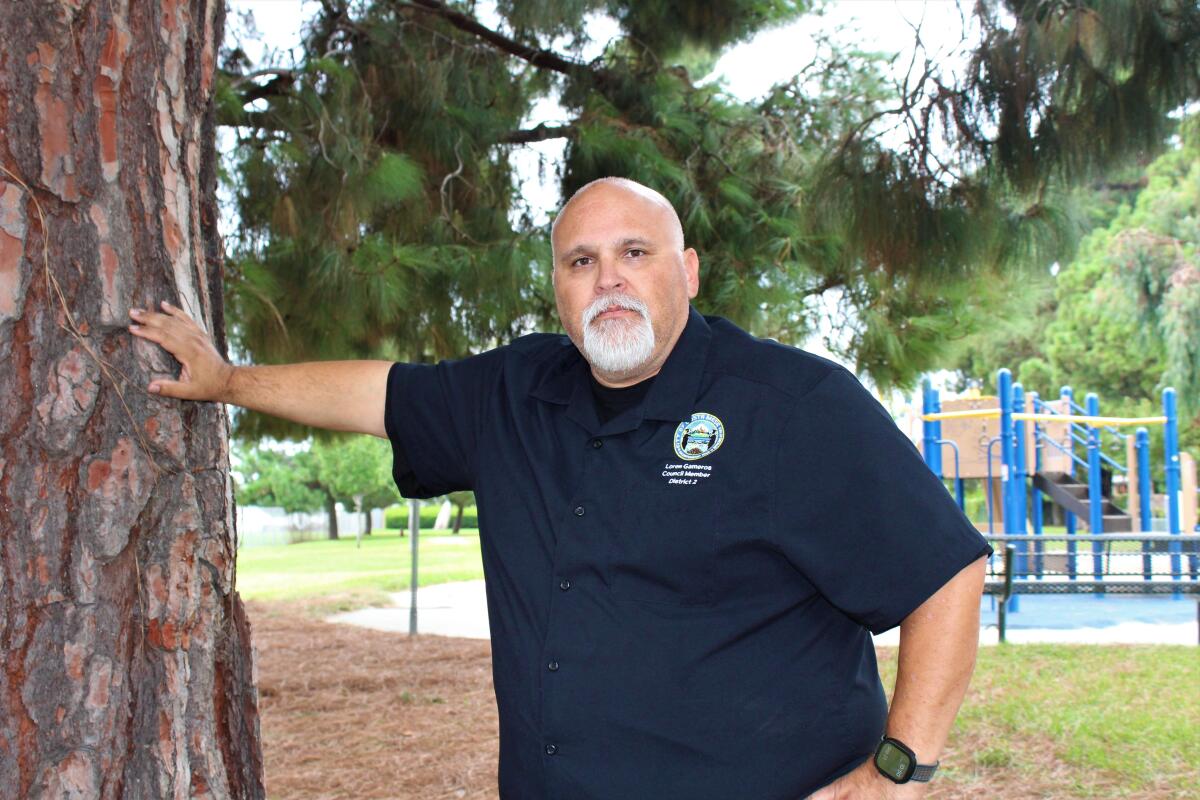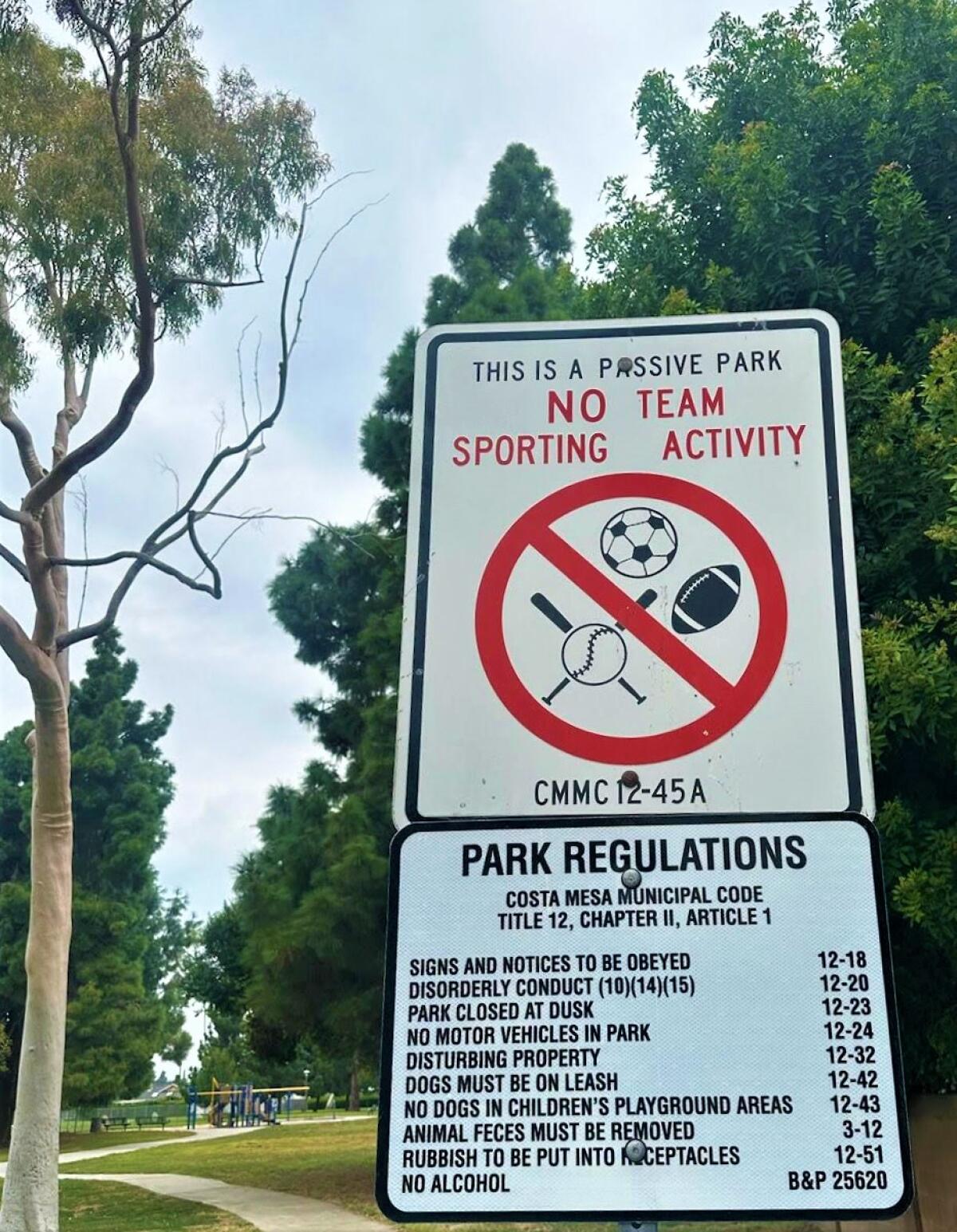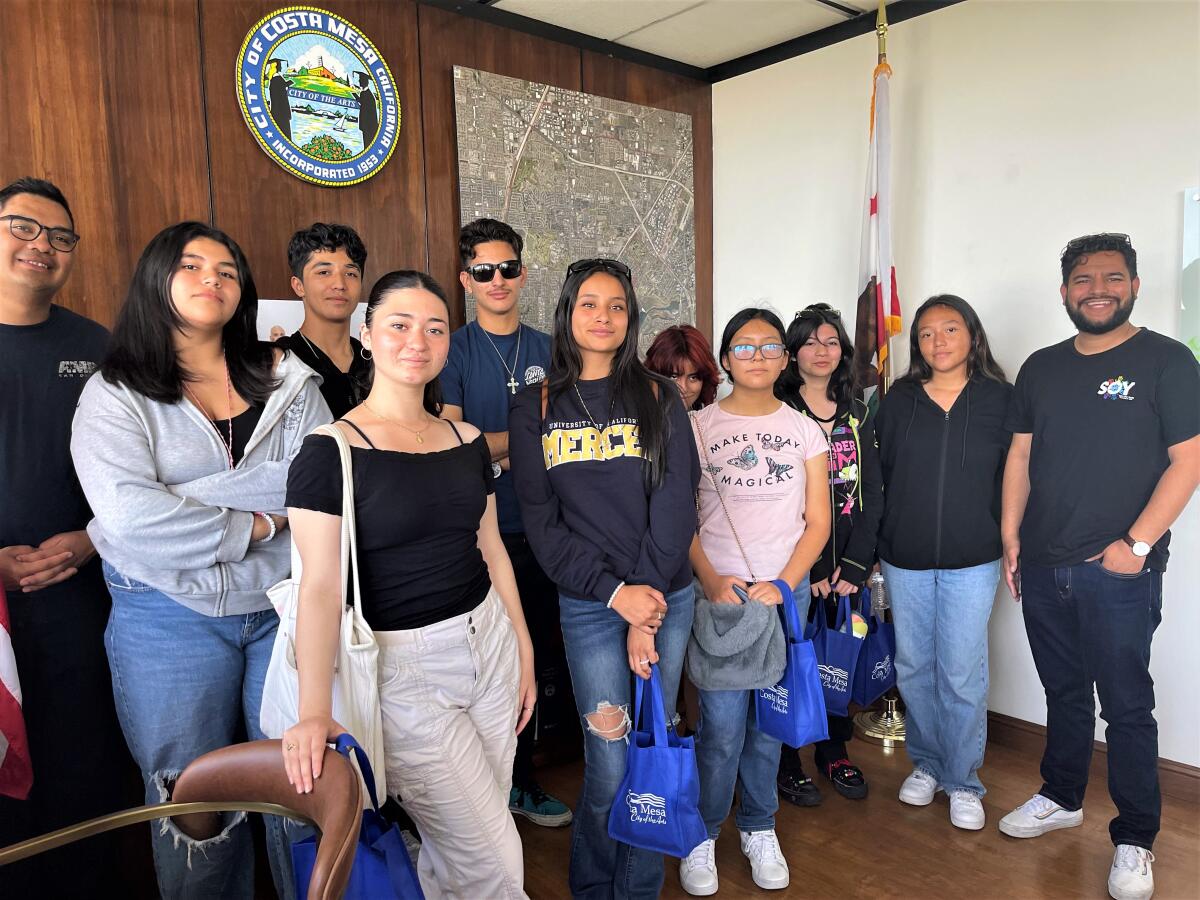Vestige of Costa Mesa’s anti-immigrant past removed as Latinos enjoy civic emergence

Costa Mesa Councilman Loren Gameros was meeting with constituents of his 2nd Council District earlier this month when he encountered a troubling situation at the city’s Paularino Park.
Latino residents, who’d invited the elected official to accompany them on a walk through the neighborhood, drew his attention to the site’s 2-acre field space.
“They said they feel like they can’t use their own park,” he recalled Thursday. “There’s a sign saying you can’t play any sports here. Boulders were put in the middle of the park, specifically to stop kids from playing soccer.”
It seemed counterintuitive to Gameros, 52, who’s lived in Costa Mesa for four decades and is known for his advocacy of youth sports.
But the city’s municipal code, referenced in the prohibitive signs near the park’s entrance, couldn’t be any clearer — in a passive park, people are simply not allowed to “participate in any games such as baseball, football, hockey, and the like.”

The shift toward passive use was made in 2007 by a conservative-majority city council, who claimed large groups brought noise, trash and other disruptive impacts to the neighborhood. To drive the point home, large boulders were intentionally placed in the playing fields.
Now, more than 15 years later, many see the move as a means of keeping Latinos — who represent 36% of the city’s population, according to U.S. Census data — away from public spaces.
“They didn’t want to have the Latino community playing soccer,” said Gameros, a Latino elected in 2020. “Imagine living in a country speaking [English] as a second language and this is all you see. It might as well have said ‘No Mexicans.’”
With a few phone calls and a trip to City Hall, the councilman requested the boulders be removed and, on Sept. 5, a work crew obliged. The following day, during a District 2 community outreach event, kids happily played soccer on the field for the first time in over a decade.
“PD was out kicking the ball around with kids playing soccer,” Gameros said. “It was probably one of the most successful community engagement events we’ve had so far.”
The removal of the Paularino Park boulders is a civic gesture that represents a seismic shift from anti-immigrant stances and policies that predominated in the early 2000s toward greater representation of Latinos in the Costa Mesa community and on the council dais.
Today, with four of seven members on the Costa Mesa City Council claiming some Hispanic heritage and with Latinas serving as city manager and deputy city manager, the city is taking decisive steps to engage with its Spanish-speaking residents.
Council meeting agendas are posted in English and Spanish, while headsets provide a live translation of what’s being discussed and translators assist Spanish speakers in providing public comment.
Many events, such as recent legal aid and rental assistance workshops, now take place twice, in both English and Spanish. And on Saturday, in conjunction with OC Public Libraries, Costa Mesa held its first city-sponsored Hispanic Heritage celebration at Lions Park.
Councilman Manuel Chavez, who represents the city’s largely Latino 4th Council District, attributes part of the shift to the city’s move toward districted elections in 2016, which led to his being sworn in in 2018 as the city’s first Latino council member.
“Before, we were an at-large city, so areas that had a higher intensity of voters or had more votes in their area received more attention,” he said. “Now, residents knowing who their council representative is and which person they should go to has been a big benefit to residents living in west-side Costa Mesa.”
Chavez recalled growing up in the shadow of policy decisions and practices that seemed to shut out minorities, particularly those from immigrant families.
“There was a perception our part of town didn’t matter as much as others” the 28-year-old recalled Wednesday. “There were also a lot of actions taken that affected residents in my area.”

A conservative-led council in 2004 voted to abolish Costa Mesa’s human relations committee and shut down a day-laborer center that had operated for 17 years. Soon after, the city grabbed headlines for being the first in the nation to begin training local police officers in immigration enforcement, the Los Angeles Times reported in 2006.
Former Councilman Allan Mansoor, who served on the dais from 2002 to 2010, before returning again in 2016 for a final term, ran on an anti-immigrant platform.
“It takes time to remove the welcome mat,” he told a Times reporter in 2006. “When you have job centers, soup kitchens and a high concentration of downscale rental units, it drives the city down.”
Four years later, at Mansoor’s behest, leaders passed a resolution declaring Costa Mesa a “Rule of Law” city, a gesture intended to communicate illegal immigrants would find no safe harbor in the city. At the time, police officers were authorized to check residents’ legal status and report them to Immigration and Customs Enforcement (ICE).
CMPD spokeswoman Roxi Fyad confirmed that while officers at one time checked the legal status of arrestees as they were booked and processed, they did not conduct such checks on residents while out on patrol. Fyad also looked into whether employees ever received immigration-related training and saw no evidence of any training sessions in the station’s records.
Geoff West, a 50-year Costa Mesa resident and owner of the long-running political blog “A Bubbling Cauldron,” said much of the historic antagonism directed at Latinos can be traced back to a core group of conservatives, including a local real estate developer with known ties to hate groups who supported Mansoor’s council race.
“He was influential among some of the people who didn’t like what they saw with Latinos in town but didn’t know how to express it — he was their voice,” West said Thursday.
“One of his complaints was ‘these darned Mexican kids’ were kicking a soccer ball around Paularino Park and were taking up all of the space. So he complained and complained and found a sympathetic ear, and the boulders went up in Paularino Park.”
Costa Mayor John Stephens acknowledged Thursday the city’s conflicted past.
“ICE was in the jails, and we were really viewed as an anti-Hispanic, anti-Mexican council. That did a lot of damage for a long time,” said Stephens, first elected to the City Council in 2016. “And somewhere along the line stopped. The openness and the attitude changed.”
Like Chavez, he credits the shift toward council district elections for the sea change that altered the demographic makeup of officials and their ability to represent a wider, more diverse populace.
Beyond removal of the Paularino Park boulders, council members these days are working with Newport-Mesa Unified School District to open up school playing fields for after-hours public use and collaborating with legislators to enhance the availability of open space on the city’s west side.
Elected officials are also advocating for rental protections and more affordable housing, two issues consistently raised by Spanish-speaking residents who now regularly attend council meetings.
“We’re really focusing on serving communities that haven’t gotten attention in the past,” Stephens said. “There’s still a lot of work to do, but we’ve made a whole lot of progress since the 2000s.”
Updates
11:34 a.m. Sept. 28, 2023: This story was updated to include information from the Costa Mesa Police Department clarifying historical practices around immigration enforcement efforts.
All the latest on Orange County from Orange County.
Get our free TimesOC newsletter.
You may occasionally receive promotional content from the Daily Pilot.




